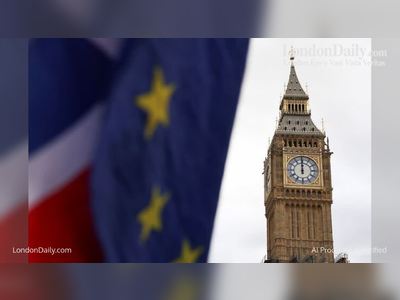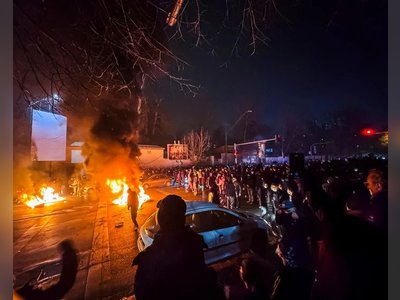Anglo-Saxons aren’t real, Cambridge tells students in effort to fight ‘nationalism’
Cambridge is teaching students that Anglo-Saxons did not exist as a distinct ethnic group as part of efforts to undermine “myths of nationalism”.
Britain’s early medieval history is taught by the Department of Anglo-Saxon, Norse and Celtic, but the terms within its own title are being addressed as part of efforts to make teaching more “anti-racist”.
Its teaching aims to “dismantle the basis of myths of nationalism” by explaining that the Anglo-Saxons were not a distinct ethnic group, according to information from the department.
The department’s approach also aims to show that there were never “coherent” Scottish, Irish and Welsh ethnic identities with ancient roots.
The increased focus on anti-racism comes amid a broader debate over the continued use of terms like “Anglo-Saxon”, with some in academia alleging that the ethnonym is used to support “racist” ideas of a native English identity.
Information provided by the Department of Anglo-Saxon, Norse and Celtic (ASNC) explains its approach to teaching, stating: “Several of the elements discussed above have been expanded to make ASNC teaching more anti-racist.
“One concern has been to address recent concerns over use of the term ‘Anglo-Saxon’ and its perceived connection to ethnic/racial English identity.
“Other aspects of ASNC’s historical modules approach race and ethnicity with reference to the Scandinavian settlement that began in the ninth century.
“In general, ASNC teaching seeks to dismantle the basis of myths of nationalism - that there ever was a ‘British’, ‘English’, ‘Scottish’, ‘Welsh’ or ‘Irish’ people with a coherent and ancient ethnic identity - by showing students just how constructed and contingent these identities are and always have been.”
One lecture addresses how the modern use of the term “Anglo-Saxon” has been embroiled in “indigenous race politics”, by questioning the extent of settlement by a distinct ethnic group that could be called Anglo-Saxon.
The term typically refers to a cultural group which emerged and flourished between the fall of Roman Britain, and the Norman conquest, when Germanic peoples – Angles, Saxons, and Jutes – arrived and forged new kingdoms in what would later become a united England. This was also the period of Old English epics such as Beowulf.
However, the term Anglo-Saxon has recently become embroiled in controversy, with some academics claiming that the term Anglo-Saxon has been used by racists – particularly in the US – to support the idea of an ancient white English identity, and should therefore be dropped.
In 2019, the International Society of Anglo-Saxonists voted to change its name to the International Society for the Study of Early Medieval England, “in recognition of the problematic connotations that are widely associated with the terms “Anglo-Saxon”.
This was triggered by the resignation from the society of the Canadian academic Dr Mary Rambaran-Olm, who has since written that the field of Anglo-Saxon studies is one of “inherent whiteness”.
She later wrote in the Smithsonian magazine that: “The Anglo-Saxon myth perpetuates a false idea of what it means to be ‘native’ to Britain.”
A statement signed by more than 70 academics in 2020 argued that the furore over the term “Anglo-Saxon” was an American import, with an open letter stating: “The conditions in which the term is encountered, and how it is perceived, are very different in the USA from elsewhere.
“In the UK the period has been carefully presented and discussed in popular and successful documentaries and exhibitions over many years.
“The term ‘Anglo-Saxon’ is historically authentic in the sense that from the 8th century it was used externally to refer to a dominant population in southern Britain. Its earliest uses, therefore, embody exactly the significant issues we can expect any general ethnic or national label to represent.”
Its teaching aims to “dismantle the basis of myths of nationalism” by explaining that the Anglo-Saxons were not a distinct ethnic group, according to information from the department.
The department’s approach also aims to show that there were never “coherent” Scottish, Irish and Welsh ethnic identities with ancient roots.
The increased focus on anti-racism comes amid a broader debate over the continued use of terms like “Anglo-Saxon”, with some in academia alleging that the ethnonym is used to support “racist” ideas of a native English identity.
Information provided by the Department of Anglo-Saxon, Norse and Celtic (ASNC) explains its approach to teaching, stating: “Several of the elements discussed above have been expanded to make ASNC teaching more anti-racist.
“One concern has been to address recent concerns over use of the term ‘Anglo-Saxon’ and its perceived connection to ethnic/racial English identity.
“Other aspects of ASNC’s historical modules approach race and ethnicity with reference to the Scandinavian settlement that began in the ninth century.
“In general, ASNC teaching seeks to dismantle the basis of myths of nationalism - that there ever was a ‘British’, ‘English’, ‘Scottish’, ‘Welsh’ or ‘Irish’ people with a coherent and ancient ethnic identity - by showing students just how constructed and contingent these identities are and always have been.”
One lecture addresses how the modern use of the term “Anglo-Saxon” has been embroiled in “indigenous race politics”, by questioning the extent of settlement by a distinct ethnic group that could be called Anglo-Saxon.
The term typically refers to a cultural group which emerged and flourished between the fall of Roman Britain, and the Norman conquest, when Germanic peoples – Angles, Saxons, and Jutes – arrived and forged new kingdoms in what would later become a united England. This was also the period of Old English epics such as Beowulf.
However, the term Anglo-Saxon has recently become embroiled in controversy, with some academics claiming that the term Anglo-Saxon has been used by racists – particularly in the US – to support the idea of an ancient white English identity, and should therefore be dropped.
In 2019, the International Society of Anglo-Saxonists voted to change its name to the International Society for the Study of Early Medieval England, “in recognition of the problematic connotations that are widely associated with the terms “Anglo-Saxon”.
This was triggered by the resignation from the society of the Canadian academic Dr Mary Rambaran-Olm, who has since written that the field of Anglo-Saxon studies is one of “inherent whiteness”.
She later wrote in the Smithsonian magazine that: “The Anglo-Saxon myth perpetuates a false idea of what it means to be ‘native’ to Britain.”
An American import
While some have argued that a single term like “Anglo-Saxon” is inaccurate as the Dark Ages were a period of population change, including the Viking invasions, others such as Prof Howard William at the university of Chester maintain that the term remains useful historically and archaeologically.A statement signed by more than 70 academics in 2020 argued that the furore over the term “Anglo-Saxon” was an American import, with an open letter stating: “The conditions in which the term is encountered, and how it is perceived, are very different in the USA from elsewhere.
“In the UK the period has been carefully presented and discussed in popular and successful documentaries and exhibitions over many years.
“The term ‘Anglo-Saxon’ is historically authentic in the sense that from the 8th century it was used externally to refer to a dominant population in southern Britain. Its earliest uses, therefore, embody exactly the significant issues we can expect any general ethnic or national label to represent.”




















